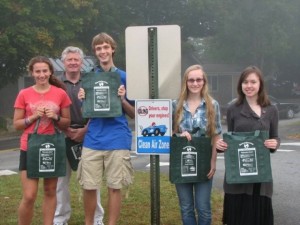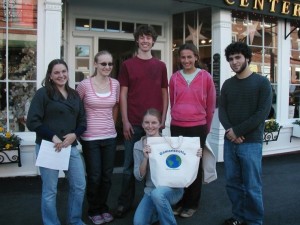ACE Alumna Profile: Chloe
Gaby Berkman
|January 26, 2012

Chloe Maxmin attended Lincoln Academy in Damariscotta, Maine for high school and is currently a first-year student at Harvard University. While in high school, Chloe founded her school’s Climate Action Club (http://laclimateaction.webs.
Where do you go to college now and what work are you doing around climate change?
I go to Harvard College, and I’m involved with various projects both and on and off campus to educate people about climate change and contribute to mitigation efforts. I’m involved with one group that is organizing the first Green Economy Caucus in the Massachusetts Legislature. I’m part of another organization that is planning a renewable energy demonstration on campus to educate students about renewable energy and Harvard’s commitment to solar panels, wind power, and geothermal. I also work with an exclusively first-year organization dedicated to making energy-efficiency improvements around campus. Earlier in the year I worked on campus to protest the Keystone XL pipeline and educate students about the proposal. I am on the Editorial Board of the Harvard Crimson, writing about environmentalism on campus and around the world. I also write for Next Gen Journal to share some of my ideas about climate change and educate a larger audience. I tweet and maintain my website–First Here, Then Everywhere–as well.
Why did you decide to continue working on climate change in college?
Nature is my passion, and I want to continue dedicating my life to protecting our planet and its inhabitants. I believe that climate change is the defining issue of my generation. Today more than any point in history we are feeling the devastating effects of global warming: rising sea levels, droughts, floods, extreme precipitation, hurricanes, decreased agricultural productivity, dangerous air quality–now is the time for action. Colleges have enormous opportunities to support environmental activism. There are speakers, professors, research options, and classes. There are multiple environmental groups to choose from on campus and many others in the community. Plus, since many colleges are located in urban areas, there is the opportunity to get involved with policy-making. I come from a rural area where this range of options did not exist. It is even more inspiring to see all the amazing work in the college community.
What were some new things or different things about working on environmental issues in college vs. high school?
There were no opportunities for environmental activism at my school. I had to start from scratch with my peers. I founded the Climate Action Club (http://laclimateactionwebs.com) , and we spearheaded campaigns that suited our school and town, and we learned about networking, campaigning, fundraising, and educating along the way. In college–at least at my school–the foundation is already there. I didn’t need to begin an eco-club. I needed to fit into an already existing structure. It was interesting to see how college students approach environmentalism, and I think that Freshmen and Freshwomen have a unique ability to see this approach from a fresh perspective. Instead of asking “how do I get started,” I found myself asking “how do I expose more Freshmen and Freshwomen to these green clubs and opportunities?”
peers. I founded the Climate Action Club (http://laclimateactionwebs.com) , and we spearheaded campaigns that suited our school and town, and we learned about networking, campaigning, fundraising, and educating along the way. In college–at least at my school–the foundation is already there. I didn’t need to begin an eco-club. I needed to fit into an already existing structure. It was interesting to see how college students approach environmentalism, and I think that Freshmen and Freshwomen have a unique ability to see this approach from a fresh perspective. Instead of asking “how do I get started,” I found myself asking “how do I expose more Freshmen and Freshwomen to these green clubs and opportunities?”
How did you find your college climate group?
I decided to join the three major environmental groups at Harvard so I could learn about their projects, goals, and strategies. It’s all about taking a leap of faith. It is a time commitment, but the best way to find “your” group is to understand all the groups and their distinct perspectives and priorities. I still haven’t committed myself to one group exclusively. All the student environmental groups overlap, and so I’m trying to find a way to unite them and increase efficiency and transparency so that, combined, there can be a bigger impact.
What did you learn in high school with your Action Team that has helped you be a college organizer?
Everything that I learned from high school is helping me in college. The major lesson that I learned in high school was that education is crucial to catalyze and sustain change. If people don’t understand why they need to act, they won’t. Environmental activism is as much human-centered as it is nature-centered. Yes, we are fighting to protect wilderness, stop deforestation, reduce pollution. But why? To create a healthier safer life for all creatures and humans. Many times activists tends to be too true to their name and only act. College students sometimes fall into this category. It is essential to remember that mitigating climate change won’t simply happen on the national, state, or even municipal level. Policy is important, but individual dedication is vital. Grassroots bottom-up movements in coordination with top-down legislation will enable a transition to a greener society.
 What are you most excited about for this year or college in terms of the impact you hope to have?
What are you most excited about for this year or college in terms of the impact you hope to have?
I spent the majority of my first semester figuring out the different opportunities at Harvard and where I fit in. Now I feel like I have better grasp of what I want to be doing, and I have a bunch of different projects lined up for this semester. I am most excited about joining a community of vibrant, enthusiastic, knowledgeable, and dedicated student environmentalists. There is a close-knit community at Harvard, and I’ve enjoyed getting to know its members. I’ve joined the Harvard newspaper, The Crimson, as an editorial writer. I am excited to write op-eds about environmental issues on campus and around the world.
What advice would you give ACE students heading off to college next year?
Maintain the lessons that you learned about environmental activism in high school, but be prepared to forget the structure. Be open to new opportunities. Be willing to try different types of campaigns. You might even stumble into something that you never dreamed of doing. There is a vast network that you can take advantage of, and try to soak in as much as you can. Attend guest lectures and try out different clubs. Make as many connections as you can. Jump in, don’t be shy. Don’t think that just because you’re a Freshman or Freshwoman that your opinions don’t count. Speak up, be active, get inspired.
Join our Youth Action Network
More Blog Posts

Unnatural, Not Unprecedented
For two weeks, residents of Southern California endured a waking nightmare. Parents raced against time – hurrying down the driveway …
Read MoreCrafting a Vision for the Future: My Experience at LCOY USA 2024
Dry and sunny Tempe, Arizona where temperatures have been over 100 F for 113 consecutive days, delegates gathered to attend …
Read More
7 Ways to Weatherproof Your Home on the Cheap (+1 Not-So-Cheap)
As colder weather sets in, understanding how to weatherproof your home is key to maintaining warmth and reducing energy costs. …
Read More